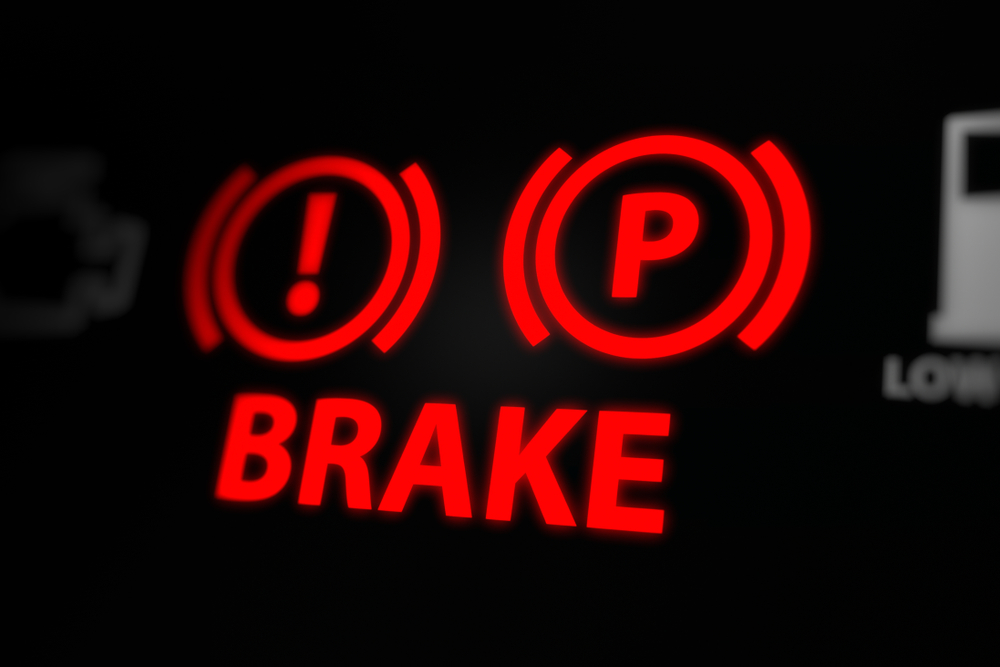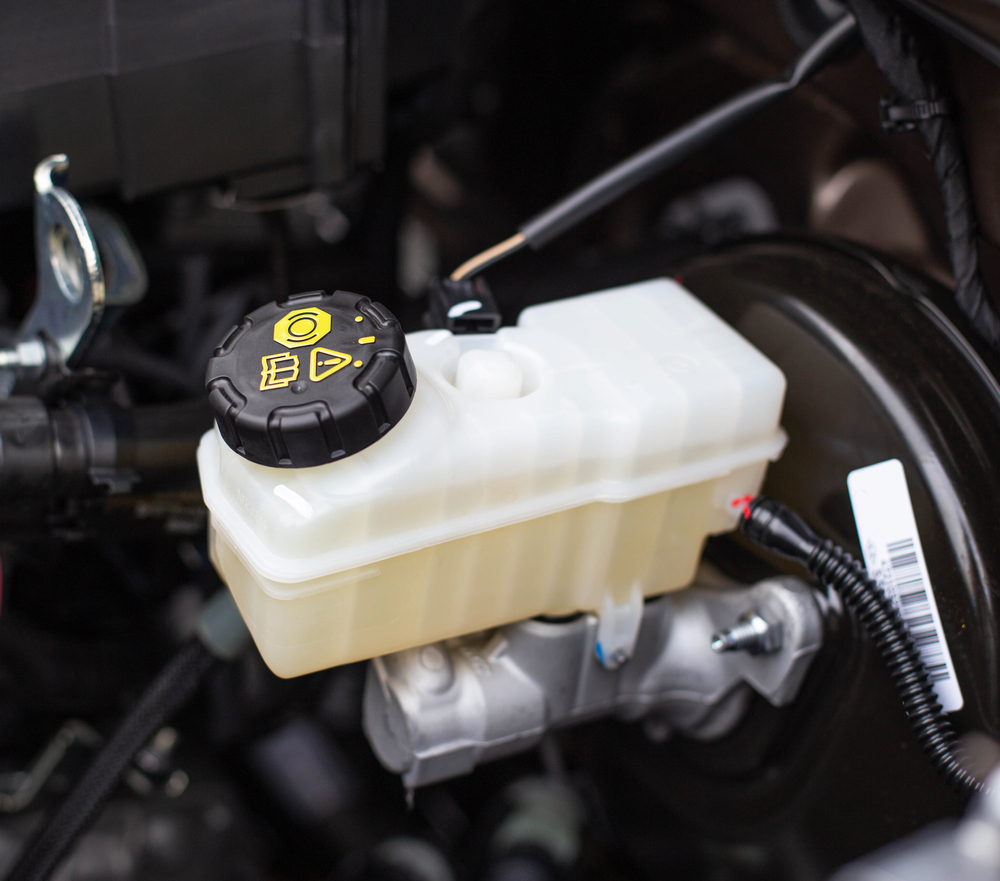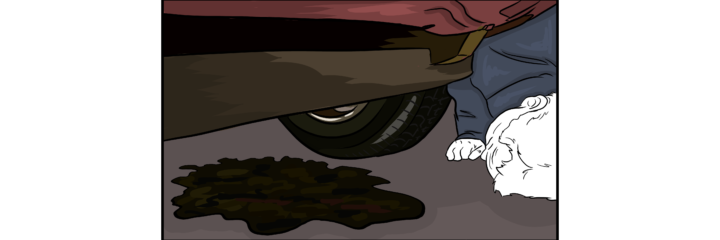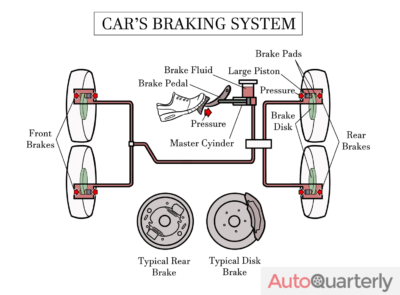The braking system is one of the most important safety features in your car – without brakes, you won’t be able to stop your vehicle safely. This braking system consists of several components, such as brake pads and discs.
While you may well already be familiar with the potential for wear and tear of these components, the brake fluid is one part of the system that is often overlooked. If your car is low on brake fluid due to a leak, your brakes won’t work properly. As you can imagine, this is extremely dangerous for you, your passengers, and other road users.
This article will run through everything you need to know about brake fluid leaks, including the symptoms, causes, and repair cost.
What Is Brake Fluid?
Before we jump into the symptoms, let’s take a brief moment to look at what brake fluid is and how it works.
Brake fluid is a type of hydraulic fluid used in vehicle braking systems. The fluid is typically yellow with an oily consistency, and it has a rather strong and unpleasant smell. This information is useful to know when looking for leaks.
How Does Brake Fluid Work?
When you press the brake pedal, brake fluid is pushed through the brake lines and into the calipers, causing the caliper piston to extend from the increase in pressure. This makes the brake pads close on the brake discs, slowing the vehicle down. As you release the brake pedal, the reverse happens, allowing the wheels to move freely.
Take a look at this short video for a good visual explanation of how the brakes work.
Is a Brake Fluid Leak Serious?
Having a brake fluid leak is very serious. If your vehicle doesn’t have enough brake fluid, the brakes won’t work properly. Should you need to stop your vehicle quickly, you may be unable to. This puts you and other road users in danger and can result in fatal accidents.
You may notice that your brakes still work, but not as well as they did before. Don’t ignore the problem, as it’ll only get worse. If you suspect or know that you have a brake fluid leak, get it checked and sorted immediately.
Symptoms of a Brake Fluid Leak
How do you know if your vehicle has a brake fluid leak? There are several symptoms to look out for, which we’ve listed below.
It’s worth noting that while a brake fluid leak often causes these symptoms, they could also be caused by other issues with the braking system.
Poor Braking Performance
Brakes should be pretty sharp and stop you quickly. If you press the brake pedal and not a lot happens, you might have a brake fluid leak.
Poor braking performance can be caused by other issues, such as worn brake discs and pads, but leaking brake fluid is often the culprit – especially when combined with any of the other symptoms listed below.
No Brake Pedal Resistance
The brake pedal should be somewhat firm, and there should be some resistance when pressing it. If you notice that the brake pedal goes straight to the floor, there’s likely an issue with either the brake master cylinder or the brake fluid level.
If your brake pedal can be pushed to the floor with no resistance, do not drive your vehicle under any circumstances.
Brake Pedal Feels Spongy
As with the previous point, your brake pedal should be reasonably firm. If it feels a little spongy, there’s probably air in the brake lines. Air can get into the brake lines when there’s not enough brake fluid, which is often caused by a leak.
Brake Fluid on the Ground
If there’s fluid on the ground near the inside of your wheels, you have a brake fluid leak. As mentioned previously, brake fluid is a yellowish color, although it does darken with age. It also feels oily to touch and has a strong smell, so it is easy to confirm that it’s brake fluid by touching it.
There may also be brake fluid buildup around the brake calipers or on the wheels themselves. If you notice fluid in other spots under your car, it’s probably caused by another leaking fluid, like transmission oil or coolant. Ideally, there shouldn’t be any fluids leaking from your car.
Illuminated Brake Warning Light

Modern cars have electrical systems that keep an eye on various components, including the brakes. If your car detects something is wrong with the brakes, it will illuminate a warning light on the dashboard.
A brake fluid leak might not be the cause of an illuminated brake warning light. However, if you see this warning light, check the brake fluid level and other brake components as it means there is something wrong with the brakes.
Causes of a Brake Fluid Leak
Now that you know the main symptoms of a brake fluid leak, let’s take a look below at some of the common causes.
Deteriorating Brake Lines
Brake lines are made from rubber and steel to provide flexibility and strength. But braking components get very hot, which over time causes the rubber lines to deteriorate.
Once the brake lines have deteriorated, they begin to leak brake fluid. It may only be a small leak, but over time this will be enough to affect the brakes to the point where they’re dangerous.
Faulty Brake Master Cylinder
The brake master cylinder converts the force you exert on the brake pedal into the hydraulic pressure required to slow your car down. The cylinder contains a lot of brake fluid, and if there’s a fault with it or it’s damaged, there may be a brake fluid leak.
It’s quite common for the brake master cylinder to leak from the rubber seals as they perish over time. Before replacing the master cylinder, be sure to check the condition of the seals.
Leaking Brake Calipers
As you apply the brakes, brake fluid moves into the brake calipers. The calipers cause the brake pads to push against the brake discs, slowing the vehicle down. If there’s a leak from the calipers, you’ll notice the brakes not working as they should.
Worn Brake Caliper Pistons
The brake caliper pistons are located inside the brake caliper. When applying and releasing the brakes, the pistons move back and forth. Over time, they may become worn out or damaged, causing them to overextend and leak brake fluid.
This point is similar to the previous one, as the caliper pistons are part of the caliper itself. As it’s such a common problem, we decided to give it its own section.
How to Diagnose a Brake Fluid Leak
Depending on the cause, diagnosing a brake fluid leak is relatively straightforward. In fact, anybody can follow the useful points below to check for brake fluid leaks – even if you have no mechanical experience.
Check the Brake Master Cylinder

Checking the brake master cylinder is the easiest thing to check, which is why we’ve listed it first. Open the hood and look for the brake master cylinder – it should look similar to the picture above.
Your vehicle’s brake master cylinder may look slightly different; this will depend on your make and model. Google “brake master cylinder” and your vehicle’s year, make, and model to get an accurate picture.
Take a look and see if there’s any fluid leaking from it. You’ll also want to check the brake fluid level, which you can do by looking at the fluid reservoir’s markings. If it’s past the low point, you probably have a leak somewhere in the system.
You can always top up the brake fluid and then keep an eye on the level to be sure. That said, we’d recommend getting the issue sorted – don’t keep topping up the fluid as a quick “fix”!
Visually Inspect the Brake Lines
Before clambering under your vehicle, first, check the ground for any leaks. If you spot any fresh fluid on the ground, it will serve as a good approximate location for where the leak is coming from.
To visually inspect the brake lines, grab a torch and get under your vehicle. Shine the torch towards the vehicle’s underside. You should be able to see the brake lines; they run along both sides of the vehicle. Follow the lines and check to see if there’s any brake fluid leaking from them.
Take a Look at the Brake Calipers
You probably won’t be able to see much of the calipers without taking the wheels off. The best way to check the brake calipers is to jack your car up and then remove each wheel, one corner at a time.
Visually inspect the calipers for leaks. They should be completely dry, albeit a little dusty from the brake pads. Be sure to check the surrounding components as the brake fluid may have dripped onto other parts.
Brake Fluid Leak Repair Cost
The cost of repairing a brake fluid leak will depend on what’s causing it and what vehicle you have. We’ve gathered some figures for what you can typically expect to pay to repair a brake fluid leak.
Please note that these prices should be used as a rough guide; repairs may cost significantly more depending on your vehicle’s age, make, and model.
Brake Line Repair Cost
Unfortunately, you can’t repair brake lines. Instead, you must replace them. The cost of replacing brake lines is between $100 and $200. The lines themselves are relatively cheap at under $50 for parts; it’s the labor that’s expensive.
Brake Master Cylinder Repair Cost
If the brake master cylinder is repairable, it’ll cost you between $100 and $200 for parts and an additional $100 to $150 for labor.
If your brake master cylinder needs replacing, it’ll set you back a lot more. You can expect to pay between $200 and $300 for parts and an additional $50 to $100 for labor.
Brake Caliper Repair Cost
Repairing the brake calipers will cost between $100 and $200 for parts and an extra $50 to $100 for labor.
If the brake calipers need replacing, you’re looking at $200 to $300 for parts and an additional $50 to $100 for labor.
Bear in mind this is the cost per axel (two calipers). If all four need replacing, it’ll cost double the quoted amount.
Frequently Asked Questions
Below are some of the most frequently asked questions regarding brake fluid leaks.
Can I Keep Driving With a Brake Fluid Leak?
If you have a brake fluid leak, you shouldn’t keep driving as your brakes won’t work properly. Faulty brakes put lives in danger. Don’t take the risk – get the leak fixed.
Is It Normal for Brake Fluid to Get Low?
Brake fluid levels should not normally get low. If your brake fluid is low, it means that something is wrong – most likely a leak somewhere in the braking system.
Can I Add Brake Fluid Myself?
Adding brake fluid yourself is pretty simple. You can add brake fluid to the brake fluid reservoir, which is located in the engine bay. Make sure you’re adding fluid to the right place, though, as you don’t want to add it to the coolant washer fluid reservoir. Also, don’t overfill; there will be minimum and maximum markings on the reservoir.
Final Words
Brake fluid leaks are serious. If you notice any of the symptoms listed in this article, get your vehicle’s braking system looked at right away. Not having working brakes can put your life, your family’s lives, and other people’s lives in danger. Don’t take the risk.
Checking your vehicle for brake fluid leaks is pretty easy, and it only takes a few minutes, so there’s no excuse not to. If you discover a leak, get it fixed, pronto. While it can be expensive depending on the cause, safety should be your first priority.
Once you have the fluid leak sorted, you’d be wise to consider a brake bleeding kit; any time you alter a component of the braking system or change the fluid, you risk introducing air into the lines.



